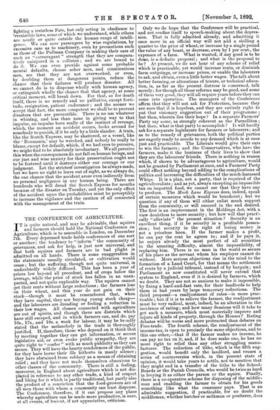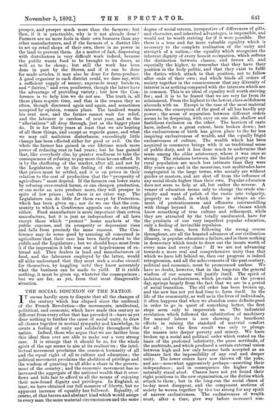- THE CONFERENCE ON AGRICULTURE.
IT is quite natural, and may be advisable, that squires and farmers should hold the National Conference on Agriculture, which is to assemble in London, on December 7th. Every depressed trade holds conferences of one sort or another; the tendency to " inform " the community of grievances, and ask for help, is just now universal, and that both squires and farmers are in bad plight is admitted on all hands. There is some exaggeration in the statements usually circulated, or cultivation would cease ; but the suffering, though not quite universal, is undoubtedly widely diffused. This has been a year of prices low beyond all precedent, and of crops below the average, while the price of stock has fallen in an unex- pected, and not quite explicable way. The squires cannot get their rents without large reductions ; the farmers lose on their wheat, and this year do not gain on their stock—though it must be remembered that, when they have capital, they are buying young stock cheap— and the labourers are dreading or feeling a reduction in their low wages. All classes connected with agriculture are out of spirits, and though there are districts which have still escaped, and in which farmers can, and do, pay 16s., 17s., and 18s. a week for labour, it may be broadly stated that the melancholy in the trade is thoroughly justified. If, therefore, those who depend on it think that by meeting together they can get information, or secure legislative aid, or even evoke public sympathy, they are quite right to " confer " with as much publicity as they can secure. They will have the hearty condolences of the public, for they have borne their ills hitherto in manly silence ; they have abstained from robbery as a means of obtaining relief ; and they have not made themselves obnoxious to other classes of the community. There is still a feeling, moreover, in England about agriculture which is not dis- played in reference to any other trade, a kind of respect and liking for it which is partly traditional, but partly also the product of a conviction that the food-growers are of all men those with whom a community can least dispense. The Conference, therefore, if it can propose any plans whereby agriculture can be made more productive, is sure, at all events, of lenient, if not appreciative, criticism. Only we do hope that the Conference will be practical, and not confine itself to speech-making about the depres- sion. That is fully admitted already, and admitting it once more in an official way will not add a shilling a quarter to the price of wheat, or increase by a single pound the value of any beast, or decrease, even by 1 per cent., the expenses of a farm. What is wanted, if any good is to be done, is a definite proposal ; and what is the proposal to be ? At present, we do not hear of any scheme of relief which is practicable, yet would increase rents, or diminish farm outgoings, or increase prices, or enable the labourers to ask, and obtain, even a little better wages. The talk about better farming, or alterations of tenure, or technical educa- tion, is, as far as the present distress is concerned, talk merely; for though all those reforms may be good, and some of them very good, they will all require years before they can come into operation. The managers of the Conference affirm that they will not ask for Protection, because they are sure that it is hopeless, and they are entirely right to put that visionary suggestion out of their programme ; but then, wherein lies their hope ? In a separate Farmers' Party say some, as strongly coherent as the Parnellites ; but then, what is that party to accomplish ? It will hardly ask for a separate legislature for farmers or labourers ; and as to the remedy of grievances, both the political parties are eagerly ready to accede to any demand which is at once just and practicable. The Liberals would give their ears to win the farmers ; and the Conservatives, who have the farmers, make it the business of their lives to show that they are the labourers' friends. There is nothing in reason which, if shown to be advantageous to agriculture, would not be granted by Parliament at once, and a Farmers' Party could effect nothing beyond adding to the complications of politics and increasing the difficulties of the much-harassed Whips. It is a plan, not a party, that is required of the agriculturalists ; and as yet, always excepting an impossible tax on imported food, we cannot see that they have any to produce. The Mark Lane Express does, indeed, speak of certain measures which would be beneficent ; but we question if any of them will either enlist much support from the community, or will succeed in the end desired. The first is an improvement in the Holdings Act, with a view doubtless to more security ; but how will that practi- cally " alleviate " the present situation ? Security is an excellent thing, if it be security in a profitable posses- sion ; but security in the right of losing money is not a priceless boon. If the farmer makes a profit, he can pay the rent he agrees to ; and if he pays it, he enjoys already the most perfect of all securities in the amazing difficulty, almost the impossibility, of replacing him. There is no man in the world so secure of his place as the servant whom his employer cannot do without. More serious objections rise in the mind to the formation of a Land Court, for that means the settlement of rents by a judicial tribunal, instead of by bargain ; and Parliament as now constituted will never extend that system to England, even if it is desired by farmers, which we doubt. They are not so anxious to make it impossible, by fixing a hard-and-fast rate, for their landlords to help them in bad years by large temporary reductions. The third proposal—a readjustment of rates—is more prac- ticable ; but if it is to relieve the farmer, the readjustment must be very radical, must, indeed, be an alteration in the incidence of rating ; and how many Sessions will it take to get such a measure, which must materially improve and injure all kinds of property, through the Houses ? Rating debates will be worse and more protracted than debates on Free-trade. The fourth scheme, the readjustment of the income-tax, is open to precisely the same objections, and to this one other,—that if the farmer makes no income, he can pay no tax on it, and, if he does make one, he has no more right to relief than any other struggling manu- facturer. The reduction of tithe, which is the fifth sug- gestion, would benefit only the landlord, and rouses a series of controversies which, in the present state of opinion, it would take years to settle, not to mention that they might end in a transfer of the tithe to the School- Boards or the Parish Councils, who would be twice as hard in levying it as either the parson or the squire. Finally, there is a co-operative scheme for disposing of the middle. man and enabling the farmer to obtain for his goods something like what the consumer pays. That is an admirable suggestion, if practicable, for no doubt the middleman, whether butcher or milkman or poulterer, does prosper, and prosper much more than the farmers ; but then, if it is practicable, why is it not already done ? Farmers are no more fools in their own business than any other manufacturers, and if the farmers of a district like to set up retail shops of their own, there is no power in the land to prevent them. As a matter of fact, dispensing with distributors is very difficult work indeed, because the public wants food to be brought to its doors, as well as to be cheap ; but still the work has been done in part by the Stores, and if it can be done for made articles, it may also be done for farm-produce. A good organiser in each district could, we dare say, with a sufficient supply of money, supersede many butchers, and " dairies," and even poulterers, though the latter have the advantage of providing variety ; but how the Con- ference is to help him we do not see. The truth is, all these plans require time, and that is the reason they so often, though discussed again and again, and sometimes accepted by opinion, remain plans. The landlord wants his rent now, and the farmer cannot wait for relief, and the labourer is careless of next year, and so the " alleviations " all drop through, just as the bigger plans do. It is for thirty years at least that we are hearing of all these things, and except as regards game, and what we may call malicious disturbance, exceedingly little change has been effected either for good or evil. On the whole the farmer has gained in our lifetime much more power of reducing rent in bad years ; but he has gained that, like everybody else, by greater readiness to take the consequences of refusing to pay more than he can afford. It is by the chaffering of the market, after all, and not by the Legislature, or by the feeling of the community, that prices must be settled, and it is on prices in their relation to the cost of production that the " prosperity of agriculture " must depend. If the farmers can lower rents by refusing over-rented farms, or can cheapen production, or can make an acre produce more, they will prosper in spite of low prices ; but there is no other way. The Legislature can do little for them except by Protection, which has been given up ; nor do we see that the com- munity to which a Conference appeals can do anything either. Food manufacture is more important than cotton manufacture, but it is just as independent of all laws except those which " protect " home markets at the public expense, and its prosperity or depression rises and falls from precisely the same reasons. The Con- ference may do some good by assuring all concerned in agriculture that their case has been fairly stated to the public and the Legislature ; but we should hope most from it if the impression it left was one of- hopelessness of ex- ternal aid. Then dealers in land and manufacturers of food, and the labourers employed by the latter, would all alike understand that they must seek a modus vivendi for themselves, by haggling until they know accurately what the business can be made to yield. If it yields nothing, it must be given up, whatever the consequences ; but we are far, as yet, from that most disagreeable situation.























































 Previous page
Previous page